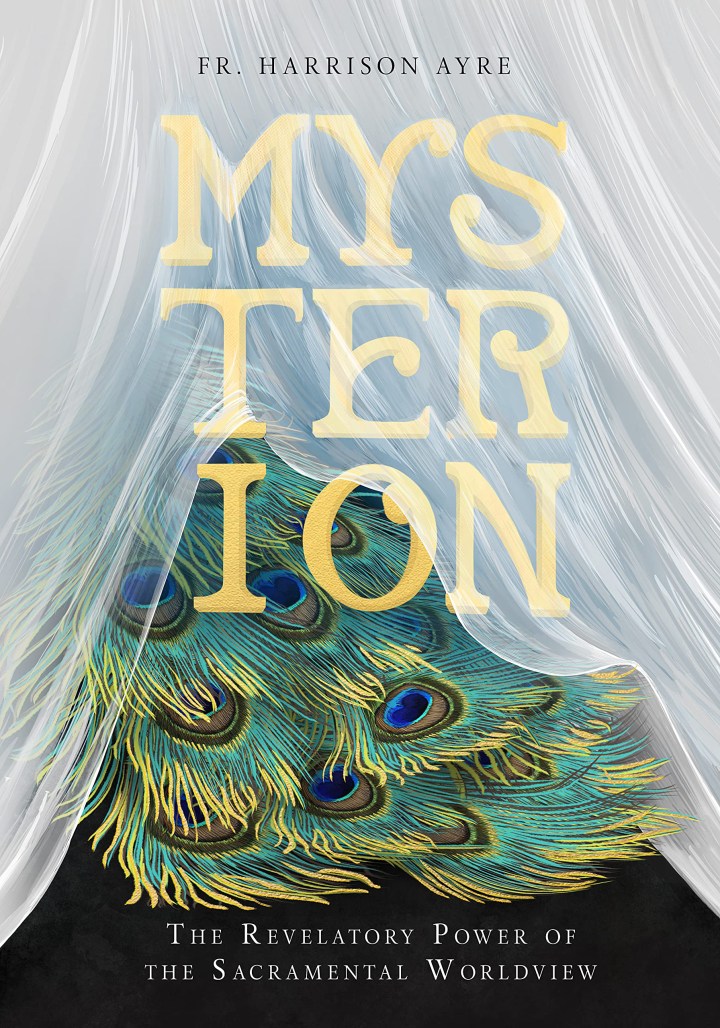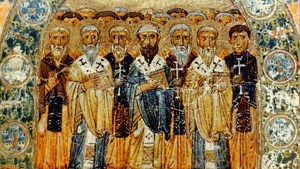Our modern world tends to be very materialistic and horizontal in its viewpoint. Many Christians recognize the error of this. But, they make an incorrect response to our materialistic culture. Many adopt a spiritualist view that sees matter itself as evil, or a dualist view that sees matter and spirit as both existing, but in barely touching realms.
Fr. Harrison Ayre presents the proper Christian approach in his new book, Mysterion: The Revelatory Power of the Sacramental Worldview.
This worldview is called “sacramental,” which makes many of us think of the seven sacraments. Although that is an aspect of it, the point is more about how physical signs can impart spiritual meanings. If I commit a mortal sin through some physical act, I really sever that relationship with Jesus by that act. On the flip side, when I go to a priest and he makes the sign of the cross over me saying, “I absolve you …” that relationship is restored.
Fr. Harrison’s book is a good introduction to this topic and presents it at a much more readable level for the average reader than others, such as Edward Schillebeeckx’s Christ the Sacrament of the Encounter with God.
Nonetheless, I would not quite recommend Fr. Harrison’s book as a first theology text, as it is not the easiest book out there. However, unlike with Schillebeeckx, I think an average Catholic who goes to Mass at least weekly and has read some other books on theology or the Bible can get a lot out of this book. (To put simply, if you have read at least one book by Scott Hahn or from Catholic Answers, I’d recommend this book, while I would not recommend Schillebeeckx unless you have at least a semester of theology first. It could also be great as a textbook for high school or undergrad theology.)
Fr. Harrison begins by noting, “We are always and everywhere ‘in Christ’ … Reflect on that statement for a minute, ponder the meaning of the word ‘in,’ think of it in all its literalness: that is what our life is like as Christians.” (1)
This whole book can be said to be a reflection on this initial line. Our lives are Christified by our Communion with him. Ayre defines sacramentality: “Sacramentality refers to something perceptible that is a sign of a particular reality and makes that reality present.” (72) This reality of the sign is what allows us as Christians to participate in Christ’s life.
He describes what he means by a sacramental worldview throughout. He notes that this is our very structure as human persons where our body communicates our personhood. (3)
We often wish for a God who reveals himself directly, but God reveals himself indirectly through his creatures: he gives signs that communicate the reality of his goodness. As Ayre notes, “The sacramental worldview recognizes that God always works through his creation. God uses particular people, times, places, and things in order to make his saving actions effective in people’s lives.” (30)
In Dei FIlius, Vatican I affirmed that we can grasp basic realities about God – like one creator God – through natural reason from nature without revelation, which points to God’s communication being built into the fabric of reality. So going against this view would be going against a council declaration.
Throughout, Fr. Harrison’s enemy is modernism. He defines it as “the denial of mediation.” (36) By this he refers back to the prior point: “Mediation means that God is able to communicate with creation through his creation. To put it differently, the way God chooses to reveal himself is almost always through something or someone.” (36)
I would personally refer to the fundamental error of modernism as the severing of the link between the physical and the spiritual. Both descriptions refer to the same reality where modernism lacks God or humans communicating spiritual reality through physical reality. Modernism is absolutely devasting. Ayre explains: “If God and the world cannot interact, then the universe could not have been created by God. Human beings could not have souls implanted in them directly by God. nor would God have been involved in their creation and formation. We’d also be stuck in this corruptible nature rather than destined for heaven.” (37) This would be a disaster for Christians!
Fr. Harrison mentions the seven sacraments in passing but specifically avoids focusing on them, as his focus is on the broader mindset or worldview. He does not forget them though. For example, he notes, “Through signs and symbols, liturgy communicates specific ways we participate in the very life of Christ made present to us today. Liturgy, then, involves much that is indeed man made, but it’s not for a man-made purpose.” (102) He also using this to defend Eucharistic abstention by those in mortal sin or grave public scandal (cf. Canon law 915-916).
Fr. Harrison repeatedly notes how Vatican II was a response to this modernism, an attempt by Church leaders to redirect us all along to a sacramental worldview. This is a far more nuanced and accurate view of the council than we often get from either traditional or progressive Catholics who make far more of “the Spirit of Vatican II” than the actual texts. He notes, “The Council was an attempt to help the Church rediscover her sacramental reality and lived participation in Christ.” (41)
Let us conclude with his own summary: “This is a vision of sacramentality that the Church Fathers and medieval Christians understood with great depth. And in recent times – especially through the efforts of the Second Vatican Council – the Church has attempted to revitalize this deeper sacramental vision … We know the seven sacraments, what they are signs of, and how they communicate the grace of Jesus’ life to us. Yet, we can be so unaware of the reality that’s been discussed throughout: in everything we say, do, and think as Christians, we are participating in the life of Christ.” (157-158)
If you are interested in exploring the structural elements of a Christian worldview, Mysterion likely helps.



